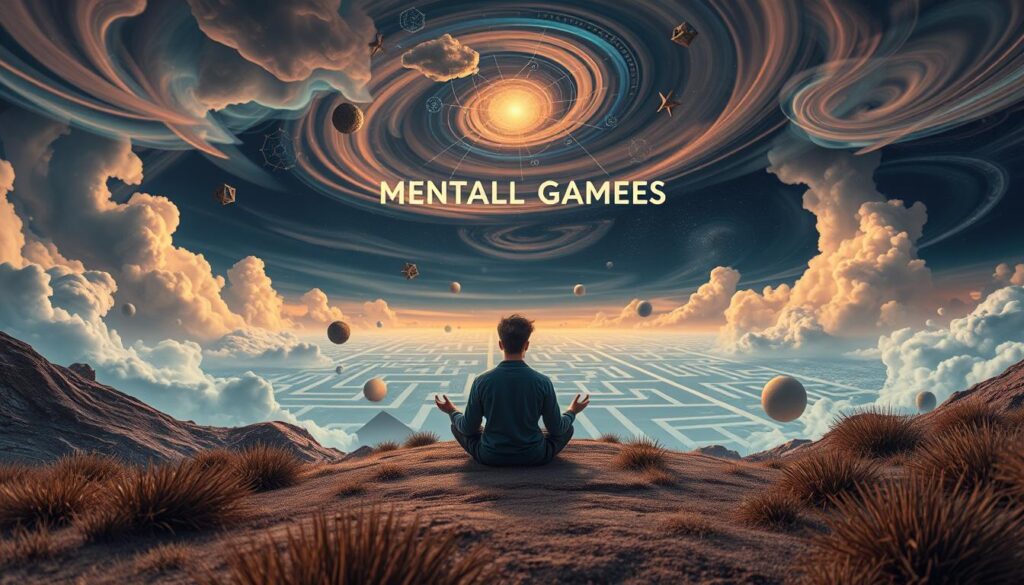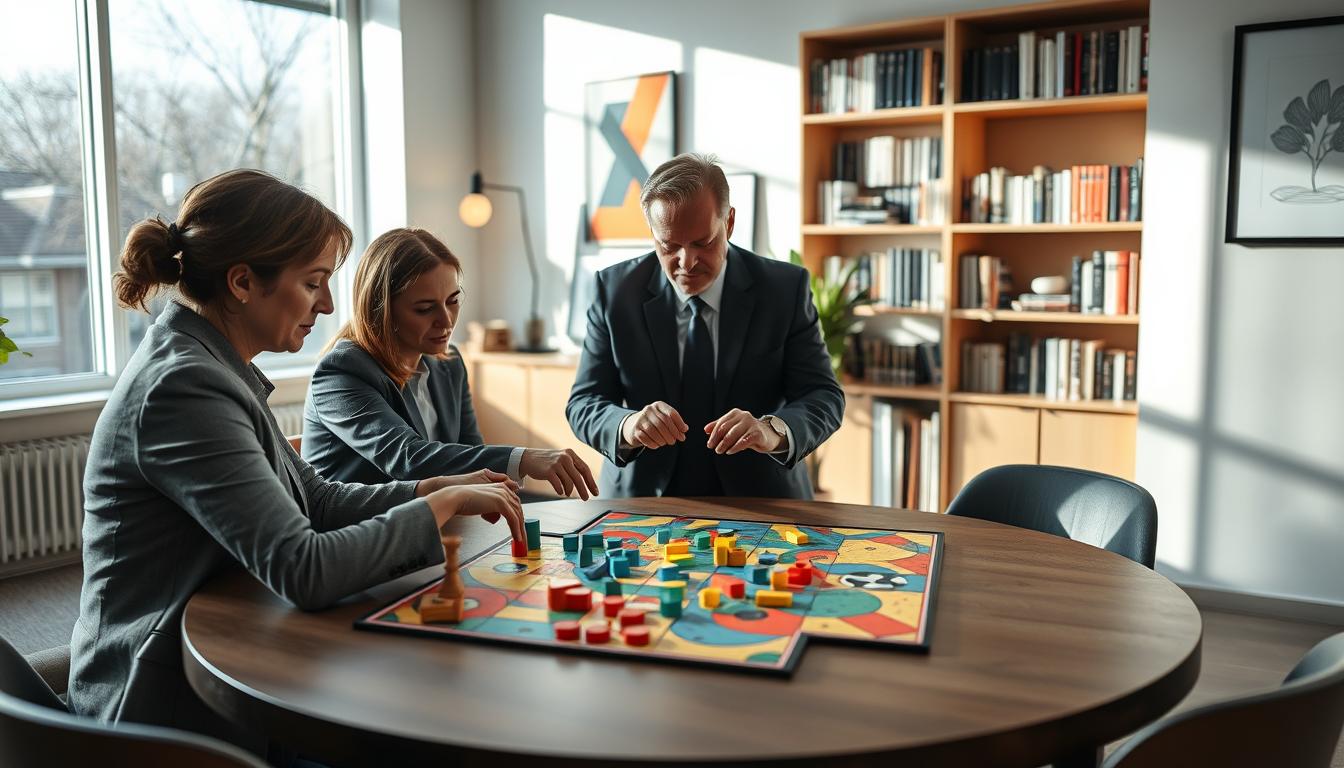Mental games to memorize task sequences and daily schedules
Ever wondered why some people manage their day so easily while others forget simple tasks? The answer often lies in mental games that help remember things better. These games are key to improving memory and making daily tasks easier.
We’ll explore the world of brain games that make remembering tasks fun. These activities boost our brain’s ability to organize and remember daily routines.
Understanding Memory and Its Importance
Memory is key in our daily lives. It helps us learn, make decisions, and do everyday tasks. It lets us keep information and use it when we need it. This is especially true for working memory, which holds and changes information briefly.
For example, when you’re following a recipe or navigating a new city, working memory is at work. It keeps important details ready for you to use right away.
Learning how memory works can help us remember better. Using strategies to improve memory can really boost our brain power. Doing mental exercises can make us more focused and attentive.
In school and work, a good memory means we can do more and do it better. This shows how important it is to keep our memory sharp as we get older.

What are Mental Games?
Mental games are activities that challenge and improve our thinking skills. They include word puzzles and memory games. These fun exercises help sharpen our problem-solving and creativity.
Brain exercises keep our thinking sharp and agile. Doing different mental activities keeps our brain active. This variety is key to keeping our mind healthy and efficient. Adding mental games to our daily routine can greatly improve our thinking abilities.

Benefits of Mental Games for Productivity
Mental games are great for boosting productivity. They help improve focus and attention. Playing these games can make you better at organizing and managing tasks.
Games like Sudoku and Scrabble are fun and help with planning. They make your mind sharper, helping you remember things better. This leads to a more efficient way of doing things.
Having a sharp mind makes it easier to adapt to new situations. This makes your daily life more productive.
Brain Games for To-Do List Memory
Brain games are key to improving to-do list memory. They help in better task management. These games make it easier to remember tasks, making daily schedules more manageable.
Techniques like visualization and chunking are very helpful. Visualizing tasks and breaking them into smaller groups improves memory. This makes it easier to remember what needs to be done.
Regularly playing brain games boosts memory. This makes managing tasks more efficient and reduces stress from forgotten tasks. Adding these games to your daily routine can make your days more organized and productive.
How Mental Games Improve Focus and Concentration
Mental games are a great way to boost focus and concentration. They challenge the brain, helping it ignore distractions and focus on tasks. Using these games also helps develop mindfulness, leading to better focus and task completion.
Regularly playing mental games can make your brain stronger. It improves your attention span, which is key in busy environments. Adding mental games to your daily routine is fun and good for your brain.
Engaging the Right Part of Your Brain with Games
Mental games are great for brain engagement. They make different parts of our brain work. Word games help with language, while puzzles improve spatial skills. Playing different games boosts various skills.
Trying out different activities makes our brain better. It helps with memory, focus, and solving problems. Regular brain training can make daily tasks easier and faster.
Types of Mental Games for Memory Enhancement
Playing different mental games can really help improve your memory. There are two main types: word games and puzzle games. Each type has its own benefits that help your brain get better and learn new things.
Word Games
Games like Scrabble and crosswords are great for learning new words. They make you think about words and how they fit together. This helps you remember words better and understand language better.
Playing these games also makes you better at talking and writing. You start to think about how to use words in the best way. It’s fun and it makes your brain sharper.
Puzzle Games
Puzzle games, like Sudoku and jigsaw puzzles, work your brain in a different way. They make you think critically and use your spatial skills. This is good for solving problems and remembering things you see.
When you solve puzzles, you get better at planning and managing tasks. It’s a fun way to improve your skills for work and life. Adding puzzle games to your daily routine can be a great way to keep your brain sharp.
| Type of Game | Primary Benefits | Key Skills Developed |
|---|---|---|
| Word Games | Vocabulary enhancement, verbal memory improvement | Cognitive agility, strategic thinking |
| Puzzle Games | Critical thinking, problem-solving skills | Visual memory, cognitive flexibility |
Fun and Effective Games to Consider
There are many engaging games that can boost memory and brain skills. From classic board games to modern puzzles, games like chess and Rubik’s Cube are fun and good for your brain. They help improve thinking, planning, and focus.
Some popular choices include:
- Chess: A timeless game that promotes strategic thinking and foresight.
- Rummikub: This classic combines elements of card games and dominoes, fostering pattern recognition and memory.
- Rubik’s Cube: Engaging and challenging, this puzzle enhances spatial reasoning and problem-solving abilities.
Playing these games every day can make you more focused and sharp. Playing with others also adds a social benefit. It makes these brain games even more rewarding.
Sudoku: A Classic for Memory Training
Sudoku is a fun number puzzle that tests your brain in many ways. It helps you think logically and spot patterns. These skills are great for improving your memory.
Playing Sudoku makes your mind sharper and helps you focus better. Doing it often can make you better at remembering things. Adding Sudoku to your daily activities can really help your memory and brain power.
Scrabble: Boosting Vocabulary and Focus
Scrabble is a great way to grow your vocabulary and improve focus. It combines strategic thinking with word knowledge. This makes it a fun way to learn and improve your language skills.
Players must think fast to make words with limited tiles. This sharpens their mental skills. It not only boosts vocabulary but also improves memory through quick thinking.
Scrabble mixes competition with creativity. It helps players understand word patterns and meanings. Playing Scrabble, whether casually or competitively, offers lasting benefits.
Crossword Puzzles: Connecting Knowledge with Memory
Doing crossword puzzles is a great way to boost both memory and knowledge. These puzzles make you think hard and use your vocabulary and general knowledge. By solving them often, you get better at thinking quickly and keeping your memory sharp.
Using Crosswords for Daily Memory Challenges
Adding crossword puzzles to your daily routine is a smart move. Each puzzle is a chance to remember things and link different ideas. This helps you learn more and keeps your memory strong. Doing crosswords regularly helps your brain grow, making you better at speaking and remembering things.
| Benefits | Effects on Memory | Improvement Areas |
|---|---|---|
| Cognitive Challenge | Increases recall ability | Vocabulary |
| Knowledge Expansion | Builds connections across topics | General Knowledge |
| Daily Engagement | Strengthens memory pathways | Mental Agility |
The Role of Visualization in Memory Retention
Visualization is a key tool for better memory. It turns complex ideas into clear pictures in our minds. This makes it easier to remember things.
Using techniques like mental mapping can really help. For example, diagrams make hard data easier to understand. Telling stories with facts makes learning more fun and memorable.
Adding visualization to your daily learning can make a big difference. It helps you not just remember, but also recall information easily.
Dual N-Back Training: A Dynamic Memory Challenge
Dual N-Back training is a fun way to improve your memory. It asks you to remember both visual and sound sequences at the same time. This makes it a great challenge for your brain.
Studies show it boosts your working memory and fluid intelligence. As you get better, your brain gets stronger. This is why many people use it to train their minds.
Doing this exercise can really help your memory and how fast you process information. People say it makes them more focused and able to remember things better. It’s a great way to improve your mental skills.
| Aspects | Effect of Dual N-Back |
|---|---|
| Working Memory | Enhances capacity through simultaneous processing |
| Fluid Intelligence | Improves overall reasoning and problem-solving skills |
| Focus | Increases attention span and concentration |
| Cognitive Flexibility | Boosts adaptability in changing situations |
Adding Dual N-Back training to your routine can really help your brain. If you want to get better at thinking, this is a great choice.
Improving Working Memory through Chunking
Chunking is a great way to boost working memory. It breaks down hard information into easy-to-handle pieces. This makes it easier to remember things and reduces brain stress.
For instance, remembering a long list of numbers becomes simpler with chunking. It groups similar items together. This method makes processing information easier and helps organize thoughts.
Using chunking daily can really help with managing tasks and being more productive. It helps you work smarter and improve your memory skills.
Benefits of Social Interaction through Brain Games
Playing brain games with others boosts both cognitive and social benefits. It helps improve emotional intelligence and communication. When friends or family play together, it builds teamwork and friendship.
These games help people think critically and solve problems. Players learn to tackle challenges better, which can improve memory. The supportive game environment also boosts overall brain function.
| Collaborative Games | Social Interaction Benefits | Cognitive Benefits |
|---|---|---|
| Scrabble | Improved communication | Enhanced vocabulary |
| Pictionary | Strengthened teamwork | Boosted creativity |
| Charades | Greater emotional expression | Increased memory recall |
| Escape Room Games | Collaboration under pressure | Improved critical thinking |
Incorporating Games into Daily Routines
Adding mental games to your daily routine makes memory practice fun. Playing these games regularly boosts your brain and helps you stay focused. It turns everyday tasks into a game, making it easier to remember things and manage your time.
Strategies for Daily Gamification
- Set Aside Time: Pick a time each day for puzzles or memory games.
- Family Involvement: Play memory games with your family to support each other’s brain training.
- Daily Challenges: Try a new mental game every week to keep things interesting.
- Reward System: Give rewards for completing memory tasks to keep you motivated.
- Incorporate Variety: Try different games to keep your brain challenged and engaged.
Conclusion
Mental games are a great way to improve memory and boost productivity. Playing different brain games helps sharpen your mind. It also makes you better at organizing your day.
These games are fun and make your mind quick and agile. They help you succeed in many areas of life.
Adding mental games to your daily routine can make a big difference. It helps you work more efficiently and stay focused. This way, you can do more in less time and keep your day running smoothly.
Overall, mental games are key to a sharper memory and better organization. Using these strategies can give you the confidence to face challenges head-on. It leads to a more productive and satisfying life.
FAQ
What are the main benefits of playing mental games?
Mental games boost your brain power. They help you remember better, stay focused, and think creatively. They also make you more productive and keep your mind sharp.
How do mental games help with memory retention?
Mental games like word puzzles and memory games work your brain. They improve how well you remember things. Techniques like seeing things in your mind and breaking down information help you remember better.
What types of mental games are most effective for improving focus?
Games like Sudoku, Scrabble, and crosswords help you focus. They make you concentrate on tasks and ignore distractions. These games also make your brain work harder, improving your attention.
Can playing brain games reduce cognitive load?
Yes, games like Sudoku help by breaking down big tasks into smaller ones. This makes it easier to remember and do things. It helps you manage tasks better.
Why is social interaction important when playing brain games?
Playing games with others is great for your social skills. It improves how you communicate and work together. Playing games with friends can also make your brain work better.
How can I incorporate mental games into my daily routine?
Make time for puzzles and games every day. Play with your family or use apps for brain exercises. This can help you remember better and be more productive.
Are there specific mental games that target memory skills?
Yes, games like Dual N-Back training focus on memory. They make you remember sequences of images and sounds. This improves your memory and brain skills.














